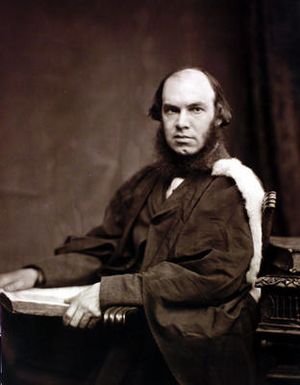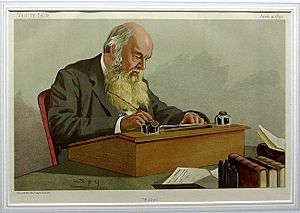Edward Caird facts for kids
Quick facts for kids
Edward Caird
FRSE FBA
|
|
|---|---|

Caird while a professor at the University of Glasgow
|
|
| Born | 23 March 1835 Greenock, Scotland
|
| Died | 1 November 1908 Oxford, England
|
| Alma mater | University of Glasgow |
| Era | 19th-century philosophy |
| Region | Western philosophy |
| School | British idealism |
| Institutions | Merton College, Oxford |
| Academic advisors | Benjamin Jowett |
|
Main interests
|
Philosophy of religion |
|
Notable ideas
|
The relation of evolutionary theory to the development of thought and culture |
|
Influences
|
|
|
Influenced
|
|
Edward Caird (born March 23, 1835 – died November 1, 1908) was an important Scottish philosopher. A philosopher is someone who studies big questions about life, knowledge, values, and how we understand the world. Edward Caird earned several special degrees, like LLD, DCL, and DLitt, which show his high level of education.
Contents
Edward Caird's Early Life and Education
Edward Caird was born in Greenock, Scotland, on March 23, 1835. His older brother, John Caird, was also a well-known thinker. Edward went to Greenock Academy and then studied at the University of Glasgow and the University of Oxford.
From 1864 to 1866, he was a Fellow and Tutor at Merton College in Oxford. A Fellow is like a senior member of a college, often involved in teaching and research.
Edward Caird's Teaching Career
In 1866, Edward Caird became a professor at the University of Glasgow. He held the Chair of Moral Philosophy, which means he taught about ethics and how people should live. He stayed there until 1893.
After leaving Glasgow, he became the Master of Balliol College in Oxford. The Master is the head of a college. He led Balliol College until he retired in 1907. In 1894, he was also made an Honorary Fellow of Merton College.
In 1900, he was chosen as an Honorary Fellow of the Royal Society of Edinburgh. This is a group that recognizes important scientists and thinkers in Scotland. In 1902, he received another special degree, a D.Litt. (Doctor of Letters), from the University of Wales.
Edward Caird's Beliefs and Influence
Edward Caird was a key figure in a way of thinking called British idealism. This idea was influenced by a German philosopher named Hegel. Idealists believe that our minds and ideas are very important in understanding reality. Caird was known for his ideas about how evolutionary theory connected to the development of human thought and culture.
He was also a founder of the Glasgow and West of Scotland Association for Women's Suffrage. This group worked to gain voting rights for women. His wife, Caroline, was also a member. One of his students at the University of Glasgow, John Watson, also became a famous philosopher.
Edward Caird's Family and Later Life
Edward Caird married Caroline Frances Wylie in 1867. They did not have any children. He passed away in Oxford on November 1, 1908, and was buried in St Sepulchres Cemetery there.


